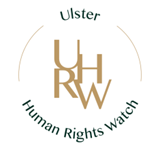Dissident event cancelled following UHRW calls
Please click here for Newsletter 10/10/2020 article
Pleas are being made today for the 30th anniversary of the killing of IRA terrorists Martin McCaughey and Dessie Grew on 9th October, not to be celebrated with a display of apparently un decommissioned weaponry.
Ahead of this event, the family of a UDR soldier, assert that weapons displayed for this anniversary in previous years are a match to those used as detailed during the inquest, and suggest that both McCaughey and Grew, along with others, may have been involved in the ambush.
They state, “Calls we made for police to seize these weapons while on display in 2010 and 2011 were simply ignored. We have good reason to believe that these are the guns used by the East Tyrone terror gang in this murder and represent potentially valuable forensic and ballistic evidence. They must be also taken off the streets if police intend to keep people safe”.
The arsenal, consisting of at least 15 weapons ranging from assault rifles to pistols, has been displayed in the past by the Cappagh-Galbally 1916 Society with apparent impunity, with videos of the arms haul posted openly on YouTube.
Human rights organisation, Ulster Human Rights Watch (UHRW), representing the family of Sgt. Jamison say that to display murder weapons is not only an outrage, but is also massively painful for families.
Ulster Human Rights Watch Advocacy Support worker, Jonathan Larner, said: “Every time these weapons are put on show they cause the bereaved families great distress.
“To put an arsenal of guns on display to glory in the terrorist killings they were used for is secondary victimisation and causes severe pain and distress to the IRA victims’ families. Such exhibitions should not take place in a democratic society, and the 1916 Society must be prevented from doing this”.
He added, “We appreciate the fact that the new Head of Legacy Investigation Branch, Det. Chief Superintendent Rowan Moore, has given the family a specific assurance that if these weapons are put on display again they will be seized. The family expects the PSNI to honour and uphold this commitment”.
